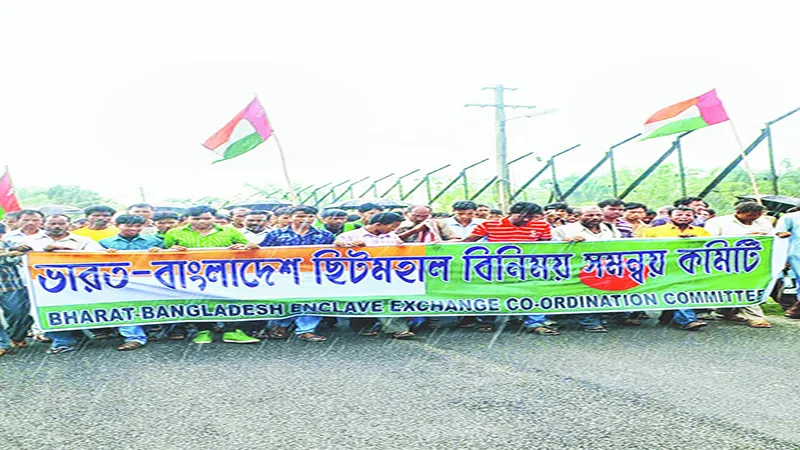The recent successful passage of the Constitution amendment bill through both houses of Parliament has cleared the way for the implementation of the land boundary agreement between Bangladesh and India. This is clearly a landmark development and a momentous achievement for the government of the prime minister, Narendra Modi, showing a clear and unambiguous preference for re-energizing India's neighbourhood policy. It not only removes all hurdles for the final settlement of India's longest border with any neighbour, but also paves the way for the exchange of enclaves and the merger of adverse possessions by re-drawing the international boundary, also known as the Radcliffe Line. This line was drawn in much haste by a British civil servant, as the date for India's Independence and Partition approached. Radcliffe had never travelled to India and consequently had no experience of serving in India. The British brought him with a purpose - to do this hatchet job which left enclaves, adverse possessions and undemarcated boundaries on the ground. The Radcliffe line passed through villages, dividing communities and villages and in some cases putting the kitchen area on different sides of the line from the rest of a village hut. Radcliffe drew the line based on maps, making no effort to relate it to ground realities. India has struggled with this legacy during the days of East Pakistan and thereafter, Bangladesh. It is this legacy of Partition that has been finally put to rest.
The unanimous passage of the LBA bill through both houses of Parliament also underlines the growing maturity of the political discourse on foreign policy in India. In particular, the larger political parties have shown that building consensus on India's foreign policy, towards its neighbours, can increasingly be a bipartisan affair and parties can set aside politics as usual for the larger national interest. While the Bharatiya Janata Party may have opposed the LBA while in Opposition, it has moved away from its earlier position, after assuming the reins of government. It is true that there has been considerable opposition from states which stand to lose territory. Thus the chief ministers of Assam, Meghalaya, Tripura and West Bengal had to be convinced about going forward with the LBA. In fact, till the last moment it was touch-and-go whether Assam will be left out of the ambit of the LBA. The handling of the LBA's passage required considerable back-room work and political cajoling, particularly of the states affected by the potential land swap. With the implementation of the LBA with Bangladesh, India would have settled all its boundary issues, including the maritime boundary with Bangladesh. The maritime boundary was settled last year with the award by an international tribunal. India had accepted international arbitration, in sharp contrast to China rejecting any form of international arbitration in its disputes with littoral states in the South China Sea. In fact, China is now in the process of reclaiming land and building airports on some of the islands under its occupation. This seeks to expand China's claim of its Exclusive Economic Zone in the South China Sea and is a certain source of conflict with other nations, claiming sovereignty over some of these islands. The world is not inattentive to this gulf between how China and India deal with disputes.
Taking recourse to telephone diplomacy, Modi spoke to his Bangladesh counterpart, Sheikh Hasina, soon after the bill was passed. Modi labelled this development as the collective will of the nation to build constructive relations with neighbours. Modi also thanked leaders of all Opposition parties in India as well as the allies for their support, and said that a "historic milestone" has been reached in India-Bangladesh ties. He also spoke to the chief ministers of all bordering states to thank them for supporting the bill that provides for the exchange of territories with Bangladesh. The external affairs minister, Sushma Swaraj, has also weighed in, by asserting that India will resolve the other main issue of water-sharing with Bangladesh, including the Teesta agreement that has been stalled by the chief minister, Mamata Banerjee. Swaraj dismissed allegations about India's "big brotherly" attitude and said that "one is 'big brother', which symbolizes arrogance, but there is also the 'elder brother' who is caring. Ours is a caring attitude". "India will maintain the attitude of the 'elder brother' with our neighbours," she added. Modi's recent visit to West Bengal may lead to an understanding to implement the Teesta agreement.
Sheikh Hasina, too, expressed satisfaction and claimed that the passing of the bill was a huge diplomatic success, and thanked everyone involved in the process. In Bangladesh, there is a palpable feeling that Hasina and her party are more comfortable with the Congress in power. This feeling is based on the close ties that developed between the Gandhi and the Sheikh family since the liberation war that led to Bangladesh's independence. Both Indira Gandhi and Sheikh Mujibur Rahman had developed close personal ties, and after the assassination of Mujibur Rahman in August, 1975, the two surviving daughters of the family, Sheikh Hasina and Rehana, and their families found refuge in India. Indira Gandhi personally made sure that they were looked after well. This also contributed to this bond of friendship. In Bangladesh, the passing of the LBA bill has also garnered bipartisan support in Bangladesh where the Opposition, the Bangladesh Nationalist Party, is currently locked in a bitter power struggle with the ruling Awami League. There is a lurking belief in Bangladesh that the BJP, as a right-wing party, leans towards the BNP, which is also regarded as right-wing in Bangladesh. There is clearly no substance to this belief. For instance, Atal Bihari Vajpayee flagged off, as prime minister, the first direct bus service between Dhaka and Calcutta in 1999 during his visit in July of that year, in the presence of Hasina. Later, during Manmohan Singh's tenure as prime minister, the first ever "Maitri Express" train service was also flagged off in 2008.
There is a long and tortuous history to the LBA. Several attempts have been made to arrive at a comprehensive settlement of the land boundary between India and Bangladesh (the erstwhile East Pakistan) since 1947. The Nehru-Noon agreement of 1958 and the agreement concerning the demarcation of the land boundary between India and Bangladesh and related matters of 1974, also called the Indira-Mujib agreement, sought to find a solution to border related issues. Three outstanding issues - an undemarcated land boundary of approximately 6.1 km, the exchange of enclaves and adverse possessions - remained unsettled. The assassination of Mujibur Rahman left Bangladesh in political turmoil. Military strongmen who came to power eagerly embraced Islamism and Bangladesh-India relations went downhill, as Bangladesh jockeyed for leverage with India by adopting anti-Indian policies that Pakistan adopted when Bangladesh was East Pakistan. Consequently, any political appetite in India to implement the LBA quickly dissipated and the whole issue languished in the freezer of Bangladesh-India ties.
The current LBA's principal guiding philosophy is the recognition of ground realities, particularly the wishes and livelihood opportunities of the people living in these areas. The issue, therefore, was to tweak the original LBA to maintain status quo of adverse possessions and change the international border to accommodate the wishes of the settled population. Effectively, a de facto situation will be converted into a de jure reality. The 2011 LBA protocol will result in a fixed demarcated boundary in all the undemarcated segments, the exchange of 111 Indian enclaves in Bangladesh with 51 Bangladesh enclaves in India, and a resolution of all adversely possessed areas. In the exchange of enclaves, India will transfer 111 enclaves with a total area of 17,160.63 acres to Bangladesh, while Bangladesh would transfer 51 enclaves with an area of 7,110.02 acres to India. While the exchange of enclaves between India and Bangladesh may seem like a loss of Indian land to Bangladesh, the fact is that these enclaves are islands inside the territory of both countries and neither side has any physical access to them from either country. Hence, the loss of land for India is notional. As for adverse possessions, India will receive 2777.038 acres of land and will transfer 2267.682 acres to Bangladesh. As in the case of enclaves, this too is a switch from a de facto situation into a de jure one since such adverse possessions are already occupied by both sides. The exchange of enclaves and redrawing of the international boundary, to maintain status quo of adverse possessions requires a constitutional amendment according to Article 368 of the Constitution. No constitutional amendment procedure is required for undemarcated sectors, as this falls within the competence of executive action.
The implementation of the LBA will surely set an upward trajectory for the future of bilateral ties with Bangladesh. The geo-strategic location of Bangladesh makes it an important player in India's Act East policy. More importantly, the economic development of India's northeastern states can be facilitated by Bangladesh's cooperation in providing seamless connectivity in the eastern region of the sub-continent. Railway connectivity between Akhaura and Agartala will enable trains to move from Agartala to Calcutta via Dhaka, easing travel for millions of Bangladeshi and Indian travelers, and provide a cost effective freight transportation route. Similar cross-border railway connectivity in the north on the Bangladesh-West-Bengal border will provide connectivity that will help Bhutan and Nepal as well. There is a strong case for sub-regional cooperation and development involving Bangladesh, Bhutan, India and Nepal. When Myanmar is brought into this equation, these five countries can forge various sub-regional structures for cooperation that can include energy transmission corridors that will benefit all countries. The LBA, therefore, is an enabling step towards another giant leap for strategic integration of the eastern region of the sub-continent that will ultimately provide the propellant for India's Act East policy.
(The writer is a Distinguished Fellow at Observer Research Foundation, Delhi and a former secretary in the ministry of external affairs and a former High Commissioner to Bangladesh).
Courtesy: The Telegraph, June 9, 2015
The views expressed above belong to the author(s). ORF research and analyses now available on Telegram! Click here to access our curated content — blogs, longforms and interviews.

